To protect your flute and guarantee peak performance, avoid these common mistakes. First, neglect regular cleaning; moisture and debris can lead to sticky keys. Use gentle cleaners, as harsh products harm the finish. Assemble your flute with care, guaranteeing proper alignment to prevent air leaks. Don't ignore pad maintenance—check for leaks frequently. Always store your flute in a hard case and avoid extreme temperatures. Control moisture with silica gel packs, and maintain correct playing posture for better technique. Regularly inspect your instrument and consult professionals for maintenance to catch issues early, and there's more to learn about flute care.
Key Takeaways
- Use harsh cleaning products, as they can damage the flute's finish and internal mechanisms.
- Soaking the flute in water or cleaning solutions can cause swelling and damage.
- Failing to properly align the body and headjoint leads to air leaks and playability issues.
- Neglecting regular inspections can result in unnoticed minor damages that worsen over time.
- Storing the flute in extreme conditions, like cars or attics, risks material damage from temperature fluctuations.
Neglecting Regular Cleaning

Neglecting regular cleaning can greatly harm your flute's performance and longevity. Without a proper cleaning schedule, moisture and debris accumulate, leading to sticky keys and sluggish response. To maintain your instrument, develop a consistent maintenance routine that includes daily and weekly tasks.
After each playing session, use a soft cleaning cloth to wipe down the body and remove moisture from the pads. This simple act can prevent buildup that diminishes sound quality. Additionally, consider using a pull-through swab to clean the inside of the flute. Implement this practice daily, especially after extended use.
Weekly, examine your instrument for any visible dirt or residue. If you notice any, use a gentle, lint-free cloth to address it. Avoid using harsh chemicals or abrasive materials, as they can damage the finish and mechanics of your flute. Regular cleaning is essential for preventing corrosion and damage, which can significantly affect the instrument's sound quality.
Finally, schedule a professional cleaning at least once a year to guarantee all parts are functioning at their best. By committing to a cleaning schedule and maintenance routine, you'll not only enhance your flute's performance but also foster a deeper connection with your instrument, ensuring it serves you well for years to come.
Using Harsh Cleaning Products
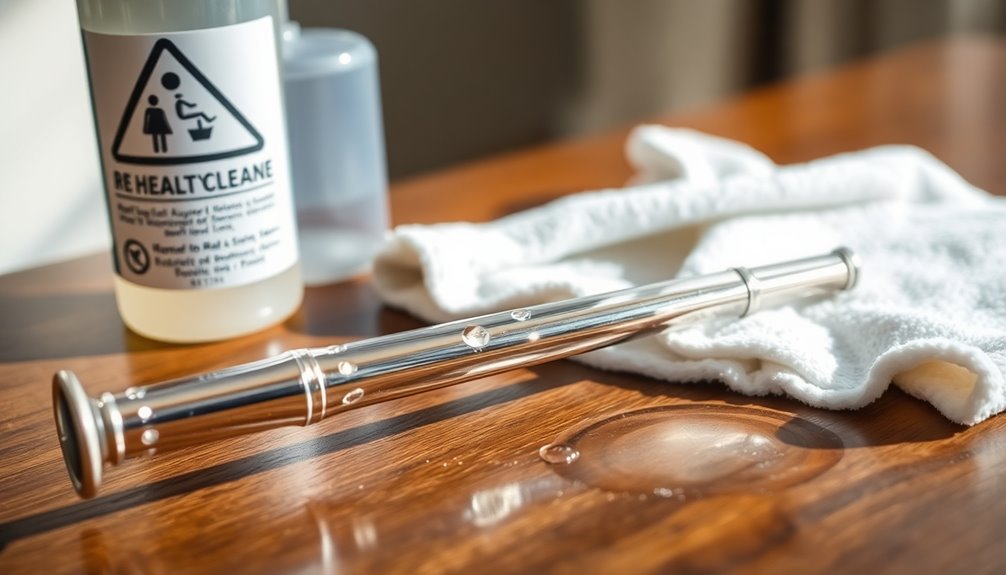
Using harsh cleaning products can seriously damage your flute's finish and internal mechanisms. While it might be tempting to use strong cleaners for quick results, these harsh chemicals can lead to long-term issues that affect both sound quality and playability.
To guarantee proper flute care, follow these guidelines:
- Choose gentle cleaners: Opt for products specifically designed for musical instruments, avoiding anything with alcohol or ammonia.
- Use a soft cloth: Always clean your flute with a microfiber or soft cotton cloth to prevent scratches on the surface.
- Avoid soaking: Don't submerge your flute in water or cleaning solutions, as this can lead to swelling and misalignment of pads.
- Read labels carefully: Always check the ingredient list on cleaning products to confirm they're safe for your flute's materials.
Additionally, regular cleaning with a flute cleaning kit can enhance hygiene and sound quality, ensuring your instrument remains in optimal condition.
Improper Assembly Techniques
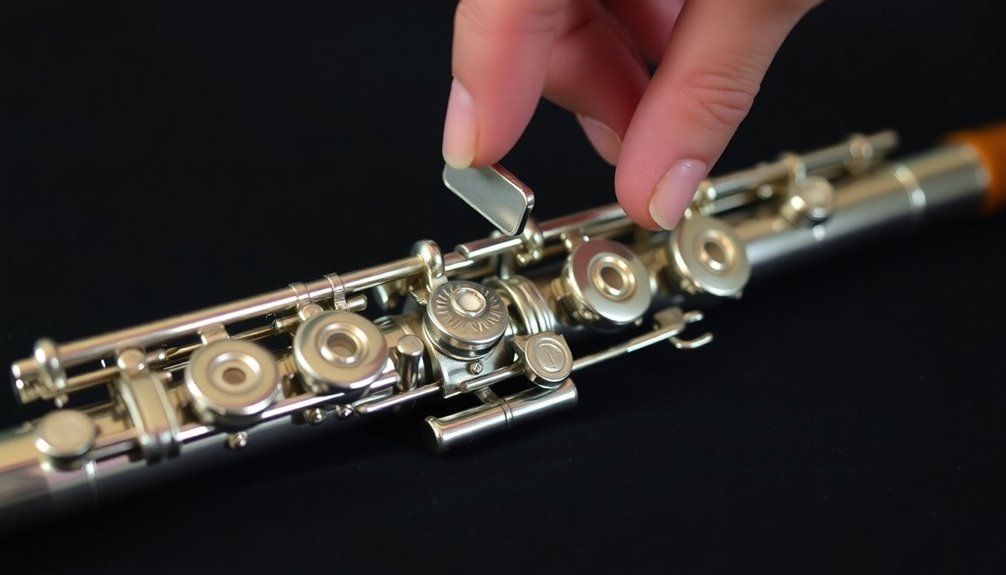
Improper assembly techniques can lead to significant damage to your flute, affecting both its functionality and longevity. When you put your instrument together, it's vital to handle it carefully.
Start by making certain that you're aligning the body and headjoint properly. Misalignment can create alignment issues that may cause pads to remain open or close incorrectly, leading to air leaks and poor sound production.
Always support the flute with both hands while assembling it, applying gentle pressure to avoid bending keys or rods. If you notice resistance when connecting sections, don't force them together; instead, check for any obstructions or misalignment. Using excessive force can damage the tenon corks or even crack the body.
Additionally, be mindful of how you position the keys when assembling. If the keys aren't aligned correctly, they can stick or become misaligned over time. This not only affects playability but can also lead to costly repairs. Regular inspections for signs of damage can help catch issues early and prevent further complications.
Ignoring Pad Maintenance
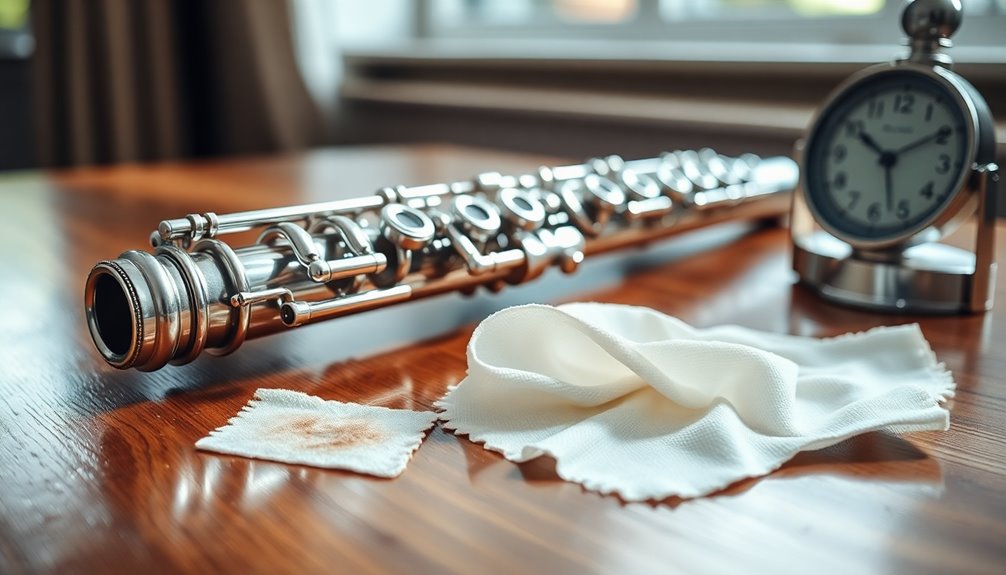
After confirming your flute is properly assembled, paying attention to pad maintenance becomes vital for peak performance.
Neglecting this significant aspect can lead to issues like leaks and poor sound quality. To keep your pads in prime condition, follow these steps:
- Regular Inspection: Check pads for wear and tear. Look for discoloration or damage that might indicate it's time for pad replacement.
- Proper Cleaning: Use a soft cloth to wipe down the pads after playing. This helps remove moisture and debris that can affect pad sealing.
- Humidity Control: Store your flute in a stable environment. Excessive humidity can weaken pads, leading to premature pad replacement.
- Professional Maintenance: Schedule regular check-ups with a technician. They can ascertain that your pad sealing is tight and replace any pads that have worn out. Regular maintenance is crucial as regular cleaning can prevent moisture buildup and enhance the lifespan of your instrument.
Storing in Unfavorable Conditions
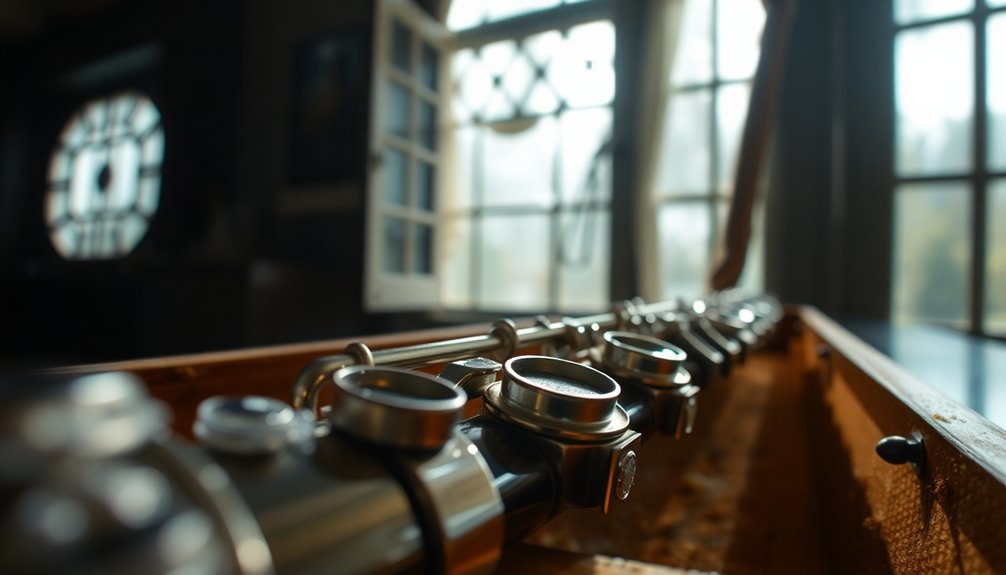
Storing your flute in unfavorable conditions can lead to significant damage over time. To protect your instrument, you need to pay close attention to both temperature control and humidity levels.
Ideally, your flute should be kept in a climate-controlled environment, with temperatures ranging between 65°F and 75°F (18°C to 24°C). Extreme heat or cold can warp the materials, affecting the overall tone and playability.
Humidity also plays a critical role in your flute's health. Aim to maintain humidity levels between 40% and 60%. Too much moisture can cause corrosion to the metal components, while excessively dry air can lead to cracks in the wood or pads. Invest in a hygrometer to monitor these levels effectively.
When storing your flute, always use a hard case to provide protection against temperature fluctuations and physical damage. Avoid leaving it in places like cars, attics, or basements, where conditions can vary dramatically. Regular maintenance, including cleaning supplies from a flute care kit, is essential for preserving the condition of your instrument.
Overlooking Minor Repairs
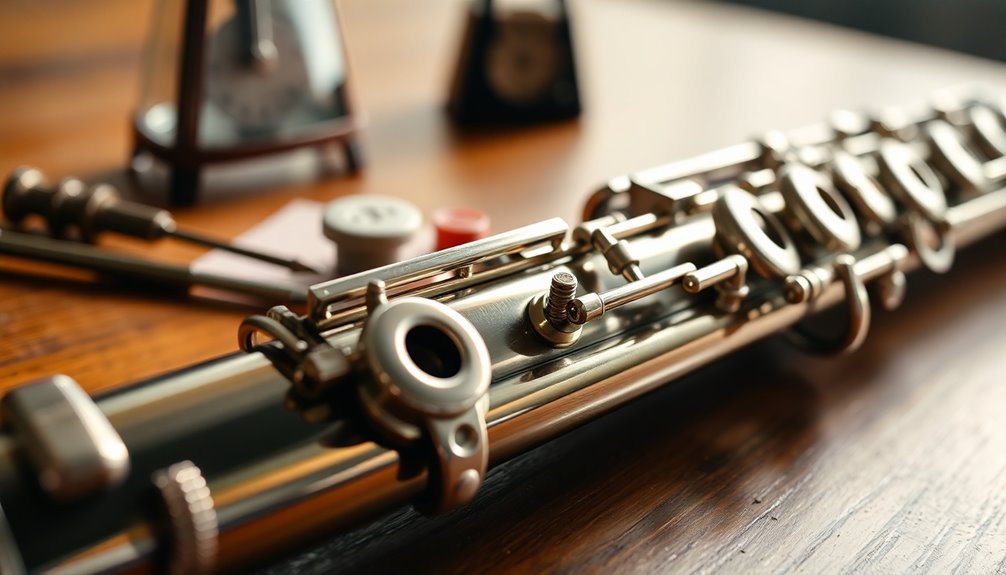
Neglecting minor repairs can lead to larger issues down the line, greatly impacting your flute's performance.
It's easy to overlook these small fixes, but doing so can affect your instrument's sound and playability.
Here are four common minor repairs you shouldn't ignore:
- Sticky Pads: If you notice any keys sticking, it's usually due to dirt or moisture. Regularly clean and check your pads to keep them functioning smoothly.
- Loose Screws: Even small screws can cause significant problems if they come loose. Make it a habit to check your flute for any screws that need tightening during your regular maintenance.
- Alignment Issues: Misaligned keys can lead to uneven sound production. Keep an eye on alignment during your practice sessions and address it promptly.
- Minor Dents: Small dents can develop over time. If you spot any, consider getting them fixed to prevent further damage. Regular use of a cleaning set can help you maintain your flute's condition and prevent such issues from arising.
Failing to Use a Case

Using a case to protect your flute is essential for maintaining its condition and longevity. Without a proper case, you risk exposing your instrument to physical damage, dust, and moisture, which can greatly impact its performance. Here are some case benefits and materials to take into account:
| Case Benefits | Case Materials |
|---|---|
| Protects against drops | Hard shell |
| Prevents dust accumulation | Soft fabric |
| Reduces temperature effects | Foam padding |
| Easy transport | Lightweight plastic |
Selecting the right case is imperative. A hard-shell case offers superior protection against impacts, while a soft fabric case is lighter and more portable. Make sure the interior has adequate padding to prevent movement during transport. Additionally, investing in a case with weather-resistant materials can further safeguard your flute from environmental elements.
Incorporating a case into your routine not only preserves your flute but also enhances your playing experience. By investing in quality case materials, you're ensuring that your instrument remains in ideal condition for years to come. Remember, consistent care and protection are essential for any musician who values their flute. Don't overlook this simple yet effective step in your instrument maintenance.
Excessive Moisture Exposure
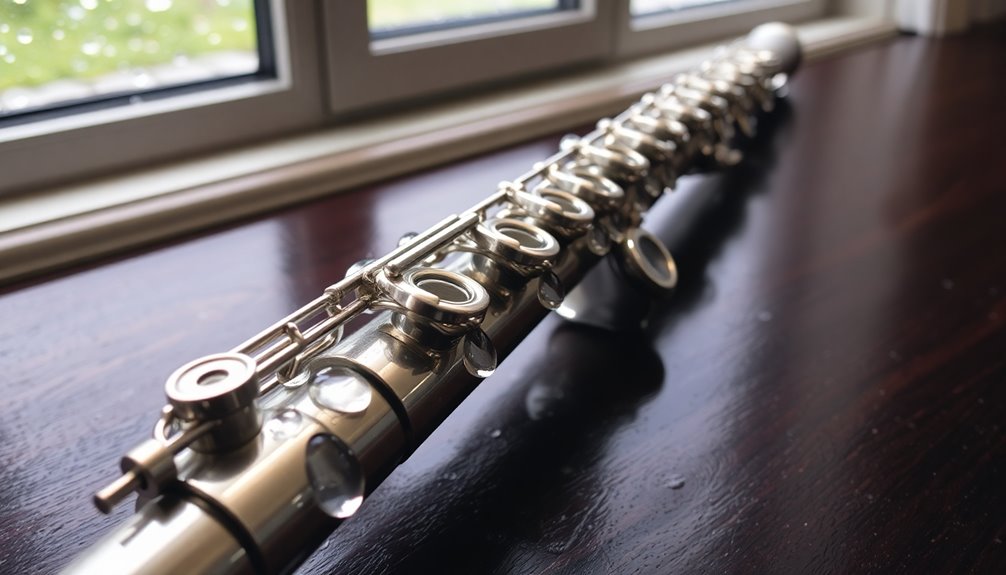
Moisture can be a flute's silent enemy, leading to serious damage over time. Excessive moisture exposure can result in condensation effects that compromise your instrument's performance and longevity.
To maintain effective moisture control, follow these essential steps:
- Dry Your Flute Regularly: After playing, use a cleaning rod with a cloth to wipe out any moisture inside the tubing. This simple act prevents buildup that can lead to corrosion and sticky pads.
- Store in a Controlled Environment: Keep your flute in a location with stable humidity. Avoid basements or attics where moisture levels fluctuate markedly.
- Use Silica Gel Packs: Place silica gel packs in your flute case. They absorb excess moisture, helping to mitigate condensation effects when the instrument is stored.
- Avoid Playing in High Humidity: If possible, refrain from playing in extremely humid conditions. This can drastically increase moisture exposure and lead to long-term damage. Regular cleaning with a flute cleaning kit ensures proper maintenance, further protecting your instrument from moisture effects.
Wrong Playing Posture

Proper posture is vital for optimal flute performance and preventing physical strain. When you play, make certain your back is straight, shoulders relaxed, and head aligned with your spine. This positioning not only enhances your breath control but also allows for better finger placement across the keys.
Position your flute parallel to the floor, keeping it close to your lips. This alignment helps maintain a steady airflow, which is essential for producing a consistent sound. If your arms are tense or your wrists are bent awkwardly, you'll struggle to achieve ideal finger placement, leading to potential mistakes and discomfort.
To further enhance your playing posture, sit or stand with your feet shoulder-width apart, distributing your weight evenly. This stance supports stability and balance, allowing you to focus on your technique rather than compensating for discomfort. Incorporating posture alignment tools can also help improve your playing posture and reduce discomfort during practice.
Regularly check in with your posture during practice sessions. If you notice tension or fatigue, take a moment to adjust.
Skipping Professional Inspections

Many flute players underestimate the importance of regular professional inspections, which can lead to significant issues down the line. Ignoring these inspections can compromise your instrument's integrity and performance.
To maintain your flute in peak condition, adhere to a consistent inspection frequency. Here are four key reasons why you shouldn't skip professional maintenance:
- Early Problem Detection: Regular inspections help identify minor issues before they escalate into major repairs, saving you time and money.
- Peak Playability: A professional can adjust mechanisms and pads, ensuring your flute responds accurately to your playing style.
- Longevity: Routine maintenance extends the life of your instrument, allowing you to enjoy it for many years without the need for costly replacements.
- Resale Value: Keeping your flute in excellent condition through professional upkeep enhances its resale value, should you ever decide to upgrade. Additionally, diaphragmatic breathing can improve your overall playing experience by ensuring you have the breath control necessary for optimal performance.
Frequently Asked Questions
How Often Should I Clean My Flute?
You should clean your flute after every play session to maintain its performance.
Regular cleaning frequency prevents moisture buildup and keeps the pads in good condition. Use a cleaning rod with a soft cloth to wipe the inside and outside of the instrument.
Additionally, follow these maintenance tips: check for debris, avoid excessive force on keys, and store it in a protective case.
Consistent care guarantees your flute stays in top shape for years.
What Are the Signs of a Damaged Pad?
Your flute's pads are like the heart of your instrument; without them in top shape, your music can falter.
Signs of pad wear include excessive air leakage, visible cracks, or a sticky feel. If you notice these issues, it's time to contemplate pad replacement.
Regularly inspecting your pads can save you from costly repairs down the line and keep your flute singing beautifully, ensuring you always belong in the music community.
Can I Use Vinegar to Clean My Flute?
You shouldn't use vinegar to clean your flute, as it can damage the pads and other components.
Instead, opt for vinegar alternatives, like a specialized flute cleaner or a mild soap solution.
Clean your flute regularly, ideally after every playing session, to keep it in top shape.
This way, you'll maintain its quality and guarantee a longer lifespan, allowing you to enjoy playing without worry about potential damage.
What Is the Best Way to Store My Flute?
To store your flute properly, invest in a high-quality flute case. This protects it from physical damage and dust.
Make sure you keep the case in an area with good temperature control; extreme heat or cold can harm your instrument.
Avoid placing your flute near windows or in direct sunlight.
How Do I Know When to Get My Flute Inspected?
Your flute deserves the royal treatment, like a priceless gem!
To maintain its brilliance, establish a regular inspection schedule. If you notice sticky keys, odd sounds, or a change in tone, it's time for a check-up.
Generally, aim for annual flute maintenance with a professional, but don't hesitate to seek help sooner if issues arise.
Keeping your instrument in top shape guarantees you'll always sound your best, enhancing your musical journey.
Conclusion
To keep your flute in top condition, avoid these common mistakes and prioritize regular maintenance. Did you know that 70% of flute repairs stem from neglecting proper care? By cleaning your instrument regularly, using appropriate products, and storing it correctly, you can greatly extend its lifespan and improve your playing experience. Remember, investing a little time in maintenance now can save you from costly repairs later. Don't underestimate the importance of proper flute care!






